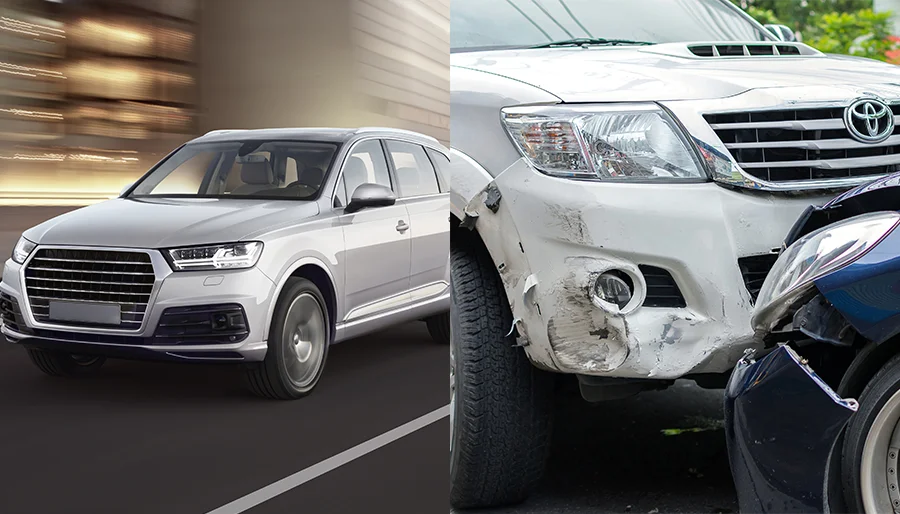
The primary difference between comprehensive and third-party car insurance lies in the scope of coverage. While third-party car insurance covers only third-party liabilities, comprehensive car insurance goes beyond covering third-party liabilities also to include damages incurred to your own car.
However, this primary distinction is just the beginning. Several other distinguishing factors set these policies apart, making it essential to understand comprehensive vs third-party car insurance to make a well-informed decision.
Here is a blog that delves into these differences in detail, helping you make the right choices for your car insurance needs.
Comprehensive vs Third-Party Car Insurance
Differentiating Factors |
Third-Party Car Insurance |
Comprehensive Car Insurance |
Meaning | Third-party insurance is the most basic car insurance that you can get. It covers damages incurred to third-party persons or property due to your insured car. | Comprehensive car insurance offers extensive and full protection, including third-party liabilities and damages to your own car. |
Coverage Details | Third-party property liabilities, including the cost of repair expenses for the damages Third-party injuries, including medical expenses, such as hospitalisation, diagnostic tests, medication, etc. A personal accident cover to cover your treatment and hospitalisation.
| Third-party liabilities, including third-party injuries or death and third-party property damages. Covers own car damages caused by accidents, theft, riots or acts of malice and natural disasters, such as cyclones, floods, earthquakes, etc. Personal accident cover to compensate for your loss due to bodily injuries or for accidental death up to ₹15 lakhs.
|
Legal Implication | Mandatory by law | Not mandatory by law |
No Claim Bonus | Not applicable | No Claim Bonus up to 50% on the premium for every claim-free year at the time of car insurance policy renewal |
Customisation with Add-On Covers | As this is a simple and basic policy, add-ons are not applicable. | Customisable with a wide range of add-ons, such as NCB Retention, Nil Depreciation, Engine Protect, Consumables Cover, EMI Protection, and more. |
Premium | The premium rate is predetermined by IRDAI and is highly affordable. | Comparatively higher in price and depends on IDV (Insured Declared Value) and various factors, such as car make and model, add-ons, etc. |
Advantages | | Covers third-party liabilities and your own car damages Customisable with add-on coverage options Makes you legally compliant
|
Exclusions | Common exclusions | Common exclusions: General wear and tear Mechanical and electrical breakdown Private cars used for commercial reasons Damage incurred due to driving without a driving licence or under the influence of intoxicating substances Loss or damage due to war or nuclear risks Consequential loss
|
Limitations | It doesn't cover the damages incurred to your own car. | It is slightly expensive compared to third-party insurance. |
Also Read:
What is comprehensive car insurance?
3rd Party Insurance vs Comprehensive Insurance: Which One Should You Buy?
Now that we have seen the difference between comprehensive and third-party insurance, let’s discuss how to choose between the two options and the factors to consider.
Driving Conditions
Consider your driving conditions, such as traffic congestion, the probability of natural calamities and the overall safety of other areas where you usually drive.
For example, suppose you drive in high-traffic areas where the risk of accidents is usually higher. In that case, you can consider purchasing a
comprehensive car insurance plan with add-on covers such as consumables cover, engine protector, and NCB retention cover.
Usage
Determine how frequently and for what purposes you drive your car. If you use your car for regular commutes and frequently for longer trips, comprehensive car insurance with adequate coverage is advisable.
On the other hand, if you use your car less frequently or often for shorter distances, third-party car insurance might suffice.
Age and Value of your Car
Consider the age and value of your car when choosing between comprehensive and third-party car insurance plans. Suppose your car is relatively new and has a higher value. In that case, comprehensive insurance coverage is highly recommended, as it provides extensive coverage, including extreme scenarios, such as theft and total loss.
On the other hand, if you have an old or less valuable car,
third-party car insurance could be a more budget-friendly option. It offers mandatory coverage without the need to pay higher premiums.
Wrapping Up
The third-party insurance and comprehensive insurance differences revolve around the legal implications, coverage features and benefits. While third-party car insurance covers third-party liabilities, comprehensive car insurance provides extensive coverage, including third-party liabilities and own damages.
Compare comprehensive vs third-party car insurance and assess your driving conditions, usage, car age and value before choosing between the two options.
to make a well-informed decision, consider how each type of car insurance aligns with your personal requirements and financial condition!
Frequently Asked Questions
Which is better, comprehensive or third-party insurance?
The better option among the two types of car insurance policies, comprehensive car insurance and third-party car insurance, should depend on your specific needs and usage circumstances.
Comprehensive car insurance is a better option if you have a brand-new, high-value car and drive frequently in accident-prone zones, as it provides extensive coverage.
On the other hand, third-party car insurance is a more cost-effective option if you own an older, less valuable car or use it less frequently.
Is it worth getting a comprehensive car insurance plan?
Yes, although a comprehensive car insurance plan is expensive, it is certainly worth the cost as it offers extensive coverage, including third-party liabilities and own damages. In addition, it offers various add-on covers to customise it according to your requirements.
What is nil depreciation in comprehensive car insurance?
Nil depreciation in comprehensive car insurance refers to an add-on option that covers the full cost of repairs without considering and deducting the depreciation applicable to your car.